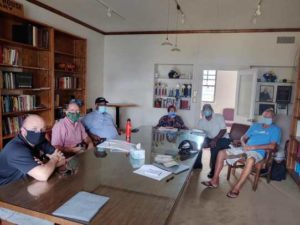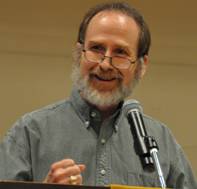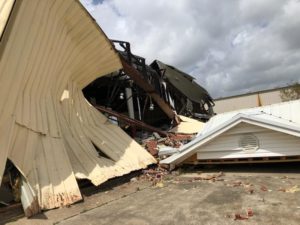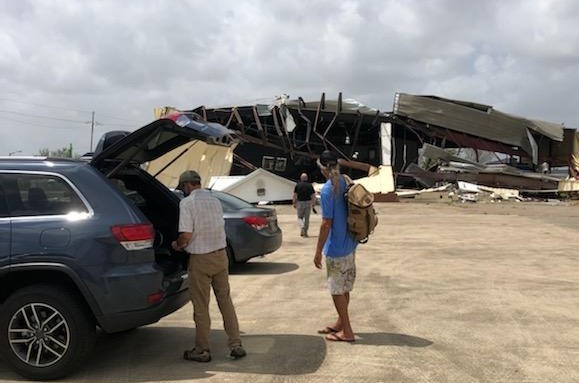Collaboration between two Baptist organizations has resulted in a plan for long-term disaster recovery work in Lake Charles, La., the coastal community devastated by Hurricane Laura Aug. 27.

CBF and National Baptist Church of America disaster response leaders meet in Lake Charles, La. (Photo/CBF)
Leaders with the Cooperative Baptist Fellowship and National Baptist Convention of America International have been meeting to map out plans for visiting teams to eventually enter the community near where the hurricane and its 100- to 135-mph winds made landfall.
The NBCA is led by Samuel C. Tolbert Jr., who is pastor of Greater St. Mary Missionary Baptist Church in Lake Charles.
Talks at his church have included Rick Burnette, CBF domestic disaster response manager, and Jason Coker and Kyle Kelley, coordinators of CBF Mississippi and Louisiana, respectively.
The hurricane-related collaboration grew out of an existing relationship between the two Baptist groups, Kelley said.
“Jason Coker and Paul Baxley have worked with him previously on The Angela Project, and we have a Together for Hope site in the northeast corner of the state where we have cooperated.”

Kyle Kelley (Photo/CBF Louisiana)
The group’s plans are contingent on the restoration of electrical service in some areas, Kelley said. “We have a workable plan, but it’s still a moving target.”
The Shreveport resident spoke with Baptist News Global about those plans and about the challenges volunteers will face when they get the green light to serve.
How was your experience during Hurricane Laura?
This was a fast-moving storm, and when it got up here it was still packing 50-mph gusts. It was very unusual because Shreveport is 250 miles from the coast. We don’t get hurricanes. What usually happens is we get a bunch of rain, and that’s it. But this was different. It was my first time to live through something like that, and it seemed to last hours and hours. But we still had much, much less damage than down south.
How did CBF churches make out elsewhere in the state?
We don’t have any CBF churches in the Lake Charles area. The closest churches we have are in Alexandria and Baton Rouge where there were some trees down and roof tiles knocked off. The power may still be out at one church in Alexandria (as of Sept. 6). It was pretty minor.
What are the conditions in Lake Charles?
People are in survival mode. When I got to within 90 miles of Lake Charles, it was unusual to see a traffic light working. People need ice. Some people have died from the heat. Sometimes we’ll see folks come back and put a blue tarp on their roof, and then leave due to the heat. I did see a Walmart open. There are lines at gas stations as far as Alexandria (100 miles away). It really is a disaster zone. People are hunkered down and trying to figure out what’s next.
What can you share about the plans CBF and NBCA are developing?
We have some plans that I think will be coming to fruition pretty soon. A local person has been identified to be the logistics coordinator for recovery operations going forward. Sam’s church has been identified as a great site to be a hub for volunteer teams. It’s large enough that people can spread out to mitigate any COVID concerns, and it’s big enough to host not just CBF groups but volunteers from civic groups and other church organizations.

Structural damage caused by Hurricane Laura in Lake Charles, La. (Photo/Kyle Kelley)
But they do not have power, so one of our first tasks is to get an industrial generator that can air condition the church and run the kitchen. From there, CBF would have the potential to multiply its efforts. There should be a volunteer sign-up on the CBF disaster website soon.
In what ways is the coronavirus complicating the response?
It is a big concern. The governor said the Lake Charles area has one of the highest infection rates in the state. And it’s an issue for CBF. Initially we thought we would not send teams unless they live close enough to return home at night. But there is hope now that we can send teams. They will have to be spaced out. We have to be vigilant in protecting people. All of that is still a work in progress. We are hoping to be able to have some teams initially from Louisiana, Texas and Mississippi — folks who are very familiar with disaster response.
What kind of work will they be doing?
The impact looks like tornado damage. You have trees fallen, roofs missing. It’s devastating. One good thing is that unlike Katrina, with all the water damage, this is almost entirely wind damage. So, we don’t expect a lot of mucking out to do or mold issues to deal with. Remember that CBF is not a first responder. Our niche has been to focus on helping particularly vulnerable people over the long haul. Many times, we are the last to leave an area.
In this case we will connect with Lake Charles people — ministers and others experienced in disaster response — to help identify who we should reach out to. They will include people who are uninsured or underinsured. It also depends on who signs up to volunteer. If we have a bunch of youth groups with no previous experience, we’ll have them picking up trash. But if we get people with carpentry or electrical skills, there is plenty of work for those folks to do.
What are the immediate next steps?
There is a degree of waiting. In terms of work, there is some moderate damage to Greater St. Mary Missionary Baptist Church, so there will be a little work there for groups to do. And we will be relying on local groups to get on the ground and assess appropriate places for us to intervene. I think members of NBCA churches will be doing some of that work. There are a lot of them in the Lake Charles area.
Contributions benefiting disaster victims may be made online through CBF Disaster Response.

